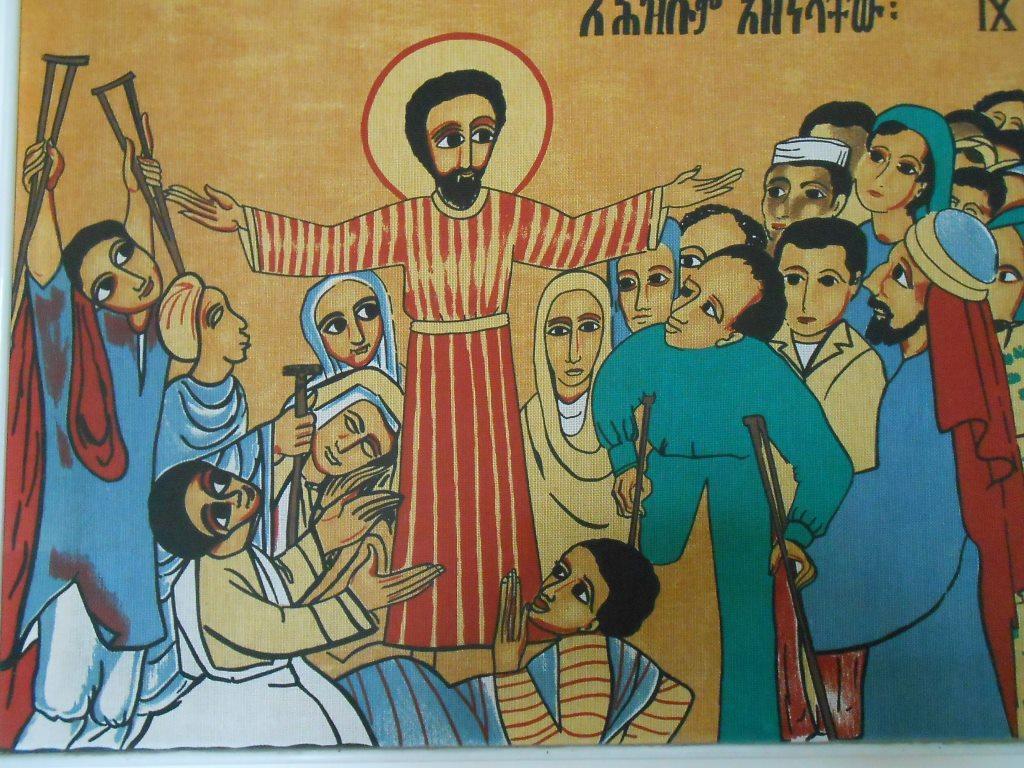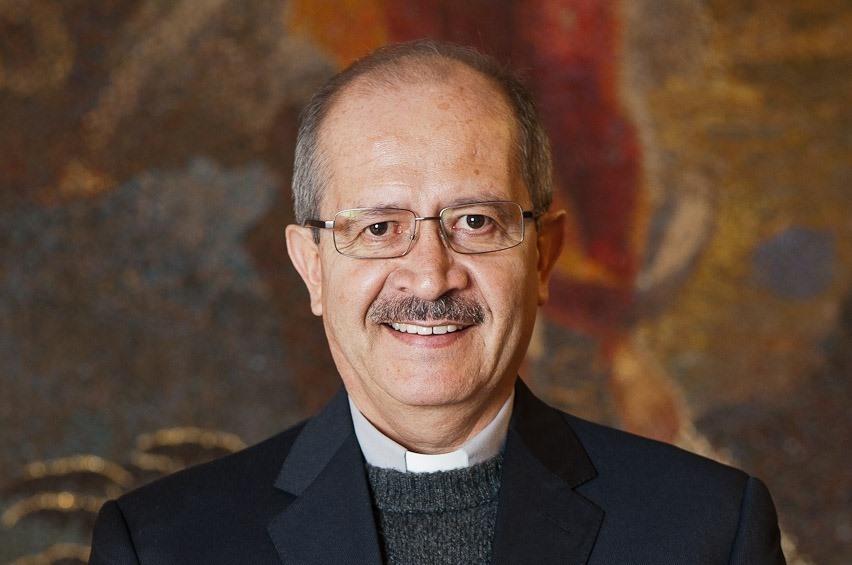Daniel Comboni
Comboni Missionaries
Institutional area
Other links
Newsletter
Happy feast of St. Daniel Comboni.
Fr. Enrique Sánchez González
Superior General
Saint Daniel Comboni
Holiness under the sign of the Cross
“I have already explained several times in my reports for the Annals of the praiseworthy Society of Cologne that God’s works are always born at the foot of Calvary and bear the mark of the Cross” (Writings, 5585).
Holiness, missionary passion, experience of God, faith, courage, the ability to persevere even in situations of great suffering and sacrifice, and above all the Cross, seem to constitute one and the same reality in the life of St. Daniel Comboni.
On coming closer to the person and missionary experience of St. Daniel Comboni, it is not hard to understand that there is a close relationship between holiness and cross, between recognising the presence of God in the life and work of the missionary and Calvary, as a road leading to the Cross.
In this way, missionary holiness reveals itself to us as a pathway which broadens every day to create space where the crosses can become fertile with the presence of God, places where the unique sanctity that belongs to God, the sanctity which brings us into the mystery of salvation offered to the whole of humanity in Christ the Crucified, manifests itself.
The Comboni spirituality, as in almost every spirituality which has as its main object the opening up of ways that may lead to holiness, the cross is not just a simple image or a magic wand. Still less it is a charm useful for banishing the phantasms of our fears.
The cross is the place where God manifests himself, hiding nothing of his divinity, capable of the total denial of self to demonstrate the lengths to which that love, which is the opposite of the death and destruction represented by the cross, will go.
The cross is the sign which allows us to recognise in our lives that which comes from God because it is there, in the cross, that the love of a God who did not spare his own Son, the only one whom he loved as only God can love, manifests itself.
Even if it may seem to be a contradiction, experience teaches us, through the lives of the saints in all ages, that there is no other way to reach sanctity except that of the cross lived for love and in love.
Crosses are school of holiness
“The intention of these prayers must not be the removal of the crosses, the sufferings, the pains and privations, because the cross and the greatest of tribulations are necessary for conversion, for the stability and progress of the works of God which must always be born, grow and flourish at the foot of Calvary” (Writings, 5258).
Surely we have often asked ourselves why the cross, and all it represents, is necessary to our experience of holiness.
I believe that life teaches us very simply that it is only when we truly realise our own poverty, our limits, our weaknesses, only when suffering strikes us and pain compels us to bend the knee, only then we will recognise that we are not God and only then we will begin to allow God to manifest himself in us. This is possible only when we discover the presence of the cross as part of our lives and when we begin to understand that crosses are not a tragedy but an opportunity to enter into the world of God.
The crosses are necessary to the pedagogy of holiness because they are a school of conversion which reawakens the values contained in that which we call holiness. Conversion turns our lives towards God and allows us to make choices which run in the direction of what is important to God. We may say that crosses make us open to God’s desires which we carry in us and this is nothing less than true sanctity.
In this sense, becoming saints does not mean we become perfect and our humanity reminds us at every instant that we can never become the centre of our existence, that we can never remove from our experience of life the sacrifice and the pain of death which form part of our humanity. This means, as Comboni understood, that our holiness becomes real when we learn to speak of it as a gift which is born at the foot of Calvary, the place of death, which is, at the same time, the place where God teaches us that it is he who is the Lord of life. It is there that everything begins and God makes us understand that becoming saints is nothing other than living love all the way, even to the extreme availability of giving our lives, all that we are, for love.
The Cross is the journey of humanity towards holiness
“I already see and understand that the Cross is such a friend to me and so close to me that I have for some time chosen it as my eternal and inseparable Bride. So the Cross will be my beloved bride and my wise and prudent teacher, Mary will be my dearest mother and Jesus my all. In their company, Most Eminent Prince, I fear neither the storms of Rome, nor the tempests of Egypt, nor the turmoil of Verona, nor the clouds of Lyons and Paris. Slowly and surely, walking on thorny ground, I will succeed in establishing and giving life to the proposed Work for the regeneration of Africa, which has been abandoned by everybody, and which is the hardest and most challenging work of the Catholic apostolate” (Writings, 1710).
Reading this text of Comboni, one clearly understands that that the crosses which lead to holiness are not those we may invent for ourselves or fruit of our own choosing. The cross is a gift which we must recognise on our journey through life, a gift which invites us to understand our existence in a different way, with a different logic, that of God. The logic of forgetting oneself, of refraining from calculating, of going against the current, of admitting one’s own weakness in order to have that strength which no one can take from us.
This is the logic of the little ones who discover their greatness in God, who see human poverty transformed into extraordinary sanctity. This is the cross that is worthy of friendship, close, chosen and bride, as Comboni says, because that which it teaches is the wisdom of God which makes us become prudent and wise, which make us live that holiness which is nothing less than living as God lives.
It is this cross that generates the sanctity which fills the heart with courage, faith and hope. It is upon the cross that we may nail our fears, our doubts, our acts, small and great, of selfishness. It is upon the cross that we agree to die to ourselves so as to open ourselves to the gift of our lives and to those whom we are called to love without limit, without hiding behind our own interests.
It is a missionary holiness since it turns us towards others, towards those of no account in the eyes of the world, those who, today, represent Christ on the cross.
It is the crosses that give an increase of strength and courage when all seems lost and when we cannot stand unaided because they compel us to remain attached to Our Lord and to recognise Him as our only strength.
It is the crosses that make us live in fidelity to Our Lord who called us, assuring us that he will never leave us alone. It is the crosses that fill our hearts with peace when all seems confusion and impossible to bear. Crosses which have not been chosen but offered as a journey towards holiness.
The Cross is beautiful
“The way God has marked out for me is the Cross. But since Christ, who died on the Cross on account of man’s unrighteousness, knew what he was doing, this is a sign that the Cross is a beautiful thing and a just thing. So let’s carry it and move ahead” (Writings, 6519).
Another question we may ask ourselves is which crosses we ought to bear, going ahead with courage, certain that they are instruments of sanctification.
Like Comboni, we too find the cross in many experiences which make up the texture of our life. The cross is the suffering we see in many parts of our world where we are present as missionaries – violence, insecurity, war and the denial of the fundamental rights of people. The cross has the face of the fear, the delusions we see in so many young people who have no certainty for their future, it has the face of the frustration lived by many of our contemporaries who cannot see the meaning of life. The cross is corruption, injustice, fraud and the exploitation of others which seem to be the dominant rules of our society.
How many times Comboni did contemplate his world devastated by so much suffering, abandoned by all, condemned and forgotten by the powerful. A world in which there seemed to be no room for dreams of hope and peace. Yet he was the man of faith, of courage and of total commitment, the saint who saw what others were unable to see.
We, too, are also in a situation, in a world where the scene is not very different and where we find ourselves challenged in our faith, our hope and in working together sustained by the power of the Lord who wants to make us saints.
But even in the time of Comboni there were other crosses that he had to bear despite the sufferings they brought. The cross of the shortage of personnel for a mission as vast as a continent. The cross of the poverty of his missionaries who were not always as good and generous as he would have liked. The cross of sickness which many of his missionaries had to bear. The cross of the unreliability of material resources, never sufficient to meet the urgent needs of the mission. The cross of the difficult demands of the mission which discouraged some and caused them to leave.
Today, we, too, are undergoing the same experience as we feel ourselves immersed in a world of rapid change and which seems deaf to our proposal and we bear the cross of the indifference of others. Today, being a missionary does not arouse interest in our contemporaries; on the contrary, they sometimes regard us with suspicion.
Today we are experiencing a reduction in our strength and in our personnel. We are just a small Institute, almost unknown in the world. We are worried as we see our houses of formation about empty and we feel sad to see the departure of some of our younger members who wish to experience another reality.
We, too, carry today the cross of the many weaknesses and the poverty of our humanity. We carry the crosses of our inability to live completely our duties as consecrated people, the cross of our self-sufficiency and our pride which entraps us in the dynamics of individualism which prevents us from creating true brotherhood and from living in deep communion. There is also the cross of comfort, the difficulty of living with a great spirit of sacrifice, the cross of superficiality and the desire not to be bothered. There is the cross of spiritual superficiality which brings us to live immersed in doing, neglecting our relationships with the Lord, the confreres and the people among whom we live in the mission. There is the cross that would have us believe that our ideas are unique, our projects the best and our lifestyle untouchable.
These are crosses which challenge us to give direction to our existence, to our concept of life, to our duty as consecrated and missionary persons. They are crosses which invite us to enter a process of sanctification which means challenging that of which we are most certain and which pertains most closely to us.
These are crosses which certainly speak of death but we must not forget that the true cross is that which opens up to life and that the cross of Our Lord always becomes the tree of life and sanctification for those who believe.
We are not afraid of the crosses and, like Daniel Comboni, we, too, can have the experience of making the crosses of the world, the Institute and our own personal crosses into an occasion for living a deeper encounter with the Lord, for discovering together with Him that it is still He who has the word of life and that it is only by basing ourselves on him that our crosses may become places of sanctity.
Through the intercession of St. Daniel Comboni, may we be helped to live our crosses as a gift and an opportunity to become the saints the mission needs.
Happy feast of St. Daniel Comboni.
Rome, 10 October, 2011
Fr. Enrique Sánchez González
Superior General




